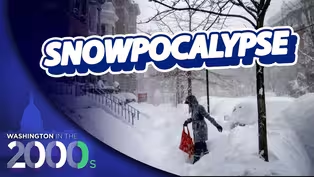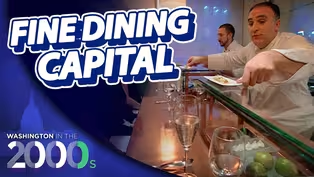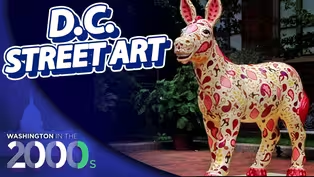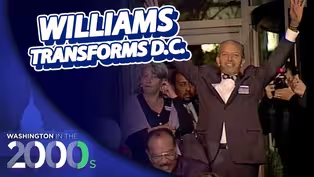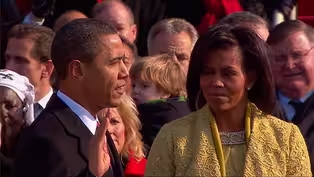Mayor Tony Williams Survives a Scandal and Gentrifies D.C.
Clip | 3m 7sVideo has Closed Captions
In 2004, DC Mayor Tony Williams' re-election campaign hit a snag.
DC Mayor Tony Williams' re-election campaign hit a snag when it was discovered that thousands of petitions submitted to get his name on the primary ballot were inaccurate or fake. The scandal forced Williams off the primary ballot, leaving a write-in campaign as his only option. He still won easily. Following his re-election, he aimed to attract 100,000 new residents to DC in the next 10 years.
Problems playing video? | Closed Captioning Feedback
Problems playing video? | Closed Captioning Feedback
Mayor Tony Williams Survives a Scandal and Gentrifies D.C.
Clip | 3m 7sVideo has Closed Captions
DC Mayor Tony Williams' re-election campaign hit a snag when it was discovered that thousands of petitions submitted to get his name on the primary ballot were inaccurate or fake. The scandal forced Williams off the primary ballot, leaving a write-in campaign as his only option. He still won easily. Following his re-election, he aimed to attract 100,000 new residents to DC in the next 10 years.
Problems playing video? | Closed Captioning Feedback
How to Watch
is available to stream on pbs.org and the free PBS App, available on iPhone, Apple TV, Android TV, Android smartphones, Amazon Fire TV, Amazon Fire Tablet, Roku, Samsung Smart TV, and Vizio.
(cheering) NARRATOR: As Mayor Tony Williams cruised toward reelection, his campaign suddenly hit a snag.
TOM: Thousands of petitions turned in by D.C. Mayor Anthony Williams to get his name on the September primary ballot may be inaccurate and some possibly even fake.
BRUCE: Those bogus names included actor Dudley Moore, who's dead; British prime minister Tony Blair and UN Secretary Kofi Annan, who are not even U.S. citizens.
NARRATOR: The forged signatures quickly ballooned into a full-blown scandal, forcing Mayor Williams off the primary ballot and leaving a write-in campaign as his only option.
He still won easily.
WILLIAMS: I was always underestimated politically.
I was a neophyte.
I didn't really know what I was doing.
You know, babe in the woods, and I always said, "Well, I must know something.
I got reelected.
I mean, I served eight years as mayor."
NARRATOR: Mayor Williams kicked off his second term with a bold pledge.
REPORTER: The mayor wants to attract 100,000 new residents to the district in the next 10 years.
WILLIAMS: We've got to lure back residents who fled the city in the past, and we will do this, but we will do it not at the expense of those who today call the District home.
HARRY: People thought he was nutty when he said, you know, we're going to add 100,000 new residents.
WILLIAMS: And actually, I think most people didn't even notice, but it's come true.
NARRATOR: The influx of new residents changed the city in lasting ways.
CATHY: The city used to be a lot of single family homes and families in apartments.
Everything started to shift to the young professional couple.
ANDREA: You go down Georgia Avenue now, on either side of the street condos, condos, condos.
NATALIE: You started seeing enormous amounts of money being put into real estate in D.C. DAN: Every single vacant house started getting gut renovated, and then the prices of the homes became exorbitant, and the only people that could move into these homes were predominantly young and white.
CHAPELLE: D.C. has changed.
It's different now.
It's... (laughter) There's a lot of white people walking around, isn't it?
(laughter) NARRATOR: As the decade progressed, the pace of change picked up.
ANDY: Anthony Williams and other folks saw Washington, D.C., as a depressed market and wanted to open it up as wide as possible.
Probably they underestimated how quickly that change was going to take shape.
HOPKINSON: By mid-2000s, it was clear that it had worked.
There wasn't really a need to continue to hit the gas.
CLINTON: A lot of people also willingly left because the money was worth it.
Sometimes, you just can't afford to say no if somebody's trying to buy you out.
NARRATOR: For more clips and to watch the full program visit weta.org/decades.
When 'Snowpocalypse' and 'Snowmageddon' Rocked DC
Video has Closed Captions
Clip | 1m 55s | Snowpocalypse and Snowmageddon blanketed the D.C. region with over three feet of snow. (1m 55s)
When DC Became a Fine Dining Capital Courtesy of José Andrés
Video has Closed Captions
Clip | 1m 57s | Chef José Andrés helped turn Washington into a dynamic food town. (1m 57s)
When a Baby Panda at the National Zoo Captured DC Hearts
Video has Closed Captions
Clip | 2m 31s | Witness the heartwarming arrival of a baby panda to the National Zoo. (2m 31s)
The Party Animals and Borf Leave Their Mark on DC Streets
Video has Closed Captions
Clip | 2m 2s | In the 2000s, political statues and graffiti by Borf left their mark on D.C. streets. (2m 2s)
Mayor Tony Williams Survives a Scandal and Gentrifies D.C.
Video has Closed Captions
Clip | 3m 7s | In 2004, DC Mayor Tony Williams' re-election campaign hit a snag. (3m 7s)
Preview: Washington in the 2000s
Preview: Special | 30s | WETA revisits the people and events that shaped Washington in the new millennium. (30s)
Providing Support for PBS.org
Learn Moreabout PBS online sponsorshipSupport for PBS provided by:
